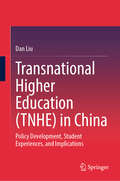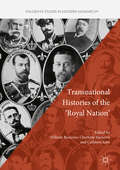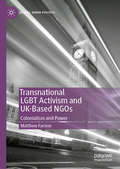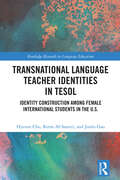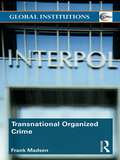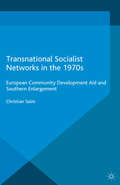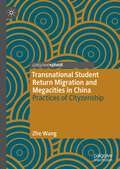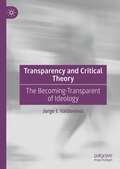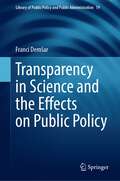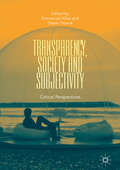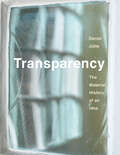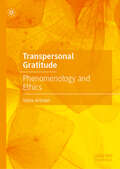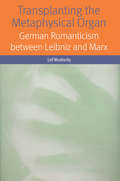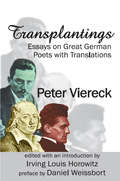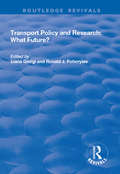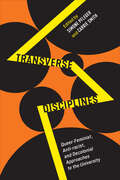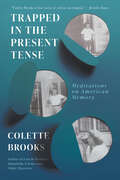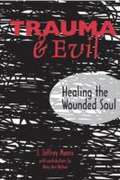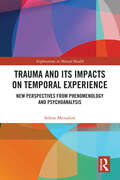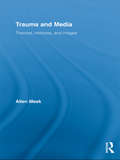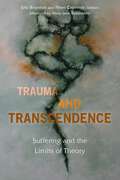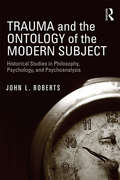- Table View
- List View
Transnational Higher Education (TNHE) in China: Policy Development, Student Experiences, and Implications
by Dan LiuThis book provides an in-depth analysis of the motivations, experiences, and challenges that Chinese students face in transnational higher education (TNHE). It traces their educational journey-from their initial motivations for seeking TNHE to their graduate employment-while exploring the academic, social, and cultural dimensions of their experiences. Readers will gain a nuanced understanding of Chinese students&’ engagement with TNHE, both within China and at later stages abroad. The book offers valuable insights for educators, policymakers, and researchers, providing a strong foundation for addressing the challenges and opportunities associated with TNHE in China. Additionally, it serves as a key resource for those interested in enhancing Chinese students&’ perceptions of and experiences in TNHE programmes. Beyond practical implications, this book contributes to the theorisation of TNHE, teacher development, and research methodologies in the field.
Transnational Histories of the 'Royal Nation'
by Milinda Banerjee Charlotte Backerra Cathleen SartiThis book challenges existing accounts of the nineteenth and twentieth centuries in which political developments are explained in terms of the rise of the nation-state. While monarchies are often portrayed as old-fashioned - as things of the past - we argue that modern monarchies have been at the centre of nation-construction in many parts of the world. Today, roughly a quarter of states define themselves as monarchies as well as nation-states - they are Royal Nations. This is a global phenomenon. This volume interrogates the relationship between royals and 'their' nations with transnational case studies from Asia, Africa, Europe as well as South America. The seventeen contributors discuss concepts and structures, visual and performative representations, and memory cultures of modern monarchies in relation to rising nationalist movements. This book thereby analyses the worldwide significance of the Royal Nation.
Transnational LGBT Activism and UK-Based NGOs: Colonialism and Power (Global Queer Politics)
by Matthew FarmerThis book contributes an analysis of UK-based non-governmental organisations engaged in transnational lesbian, gay, bisexual, and trans (LGBT) activism, within a broader recognition of the complexities that British colonial legacies perpetuate in contemporary international relations. From this analysis, the book suggests that greater engagement with intersectional and decolonial approaches to transnational activism would allow for a more transformative solidarity that challenges the broader impacts of coloniality on LGBT people’s lives globally. Case studies are used to explore UK actors’ participation in the complexities of contemporary transnational LGBT activism, including activist responses to developments in Brunei between 2014 and 2019, and the use of LGBT aid conditionality by Western governments. Activist engagements with legacies of British colonialism are also explored, including a focus on ‘sodomy laws’ and the Commonwealth, as well as the challenges faced by LGBT people seeking asylum in the UK.
Transnational Language Teacher Identities in TESOL: Identity Construction Among Female International Students in the U.S. (Routledge Research in Language Education)
by Hyesun Cho Reem Al-Samiri Junfu GaoDrawing on Bakhtin’s notion of ideological becoming and the concepts of intersectionality and transnationalism, this volume offers a unique conceptual framework to explore and better understand the identity construction and negotiation of international TESOL students. Focusing on female graduate students studying in the U.S., the text utilizes rich narratives to illustrate how nuanced language teacher identities develop through complex dialogic processes relating to language, race, and gender—as well as migration experiences—and individuals’ integration in academic and professional communities. Ultimately, the text contests deficit reductionist views of transnational students that are implied by educational policies and administration. This text will benefit scholars, academics, and students in the fields of bilingualism, TESOL, multicultural education, and language identity more broadly. Those involved with teaching and teacher education, as well as language and culture in general, will also benefit from this book.
Transnational Legal Ordering and State Change
by Gregory ShafferLaw can no longer be viewed through a purely national lens. Transnational legal ordering affects the boundary of the state and the market, the allocation of power among national institutions, the role of professions and their expertise, and associational patterns that provide new normative frames. This book breaks new ground for understanding the impacts of transnational legal ordering within nation-states in today's globalized world. The book addresses the different dimensions of state change at stake and the factors that determine these impacts. It brings together leading scholars from sociology and law who study the effects of transnational legal ordering within different countries. Their case studies illustrate how transnational legal ordering interacts with national law and institutions in different regulatory areas, and cover anti-money laundering, bankruptcy, competition, education, intellectual property, health, and municipal water law and policy in different countries. The book explains the extent and limits of transnational legal ordering in today's world.
Transnational Organized Crime
by Frank MadsenWith organized crime estimated to generate billions of dollars every year through illegal activities such as money laundering, smuggling of people and goods, extortion, robbery, fraud and insider trading, authorities are increasingly working together to combat this increasing threat to international security and stability. In this book former police officer Frank Madsen provides a much needed, short and accessible introduction to transnational organized crime, explaining its history and the key current issues and clearly examining the economics and practices of crime in the era of globalization. Key issues discussed include: the war on drugs anti-money laundering efforts the relationship between organized crime and terrorism development of ‘Internet based’ criminal activity international response to transnational organized crime. Illustrated by a series of researched case studies from around the world, Transnational Organized Crime is essential reading for all students and researchers in International Relations, International Law and Criminology.
Transnational Socialist Networks in the 1970s: European Community Development Aid and Southern Enlargement (Palgrave Studies in the History of Social Movements)
by Christian SalmTransnational Socialist Networks in the 1970s argues that western European socialist parties' transnational cooperation across national borders significantly influenced politics and policy-making in what was the European Communities (EC). It focuses on the network-like informal structures that characterised transnational cooperation between the party members and leaders of different socialist parties involved in European affairs. Taking the example of two case studies, namely EC development aid policy and EC southern enlargement policy, the book demonstrates that the socialist parties strengthened their informal transnational network structures for the purposes of debating ideological and programmatic issues and finding policy solutions to common challenges in both policy fields. Moreover, it shows that the networks developed various functions to influence European governance. Against this background, the analysis in this book makes not only a significant contribution to the study of transnational networks of western European socialist parties and the history of European integration, but also adds to the understanding of the role of transnational networks in European politics and policy-making.
Transnational Student Return Migration and Megacities in China: Practices of Cityzenship
by Zhe WangThis book is a study of the return migration of overseas Chinese students. By 2018, over 3.5 million Chinese students had returned from overseas universities to China, with the megacities of Beijing, Shanghai, and Shenzhen representing by far their main destinations. In other words, when overseas students return to China, many do not return to their hometown but usually land, work and settle down in Beijing, Shanghai and Shenzhen. Their return migration is thus not only transnational, but also internal-urban. This book adopts a multi-level geographical analysis to explore this important phenomenon, exploring why and how returnees choose these three cities and how they experience and interpret their everyday lives in these megacities after their return. In doing so, it highlights the importance of cultural logics and multiscalar thinking of transnational Chinese students’ return migration and illuminates how their transnational migration reproduces domestic socio-spatial inequalities. This book brings an important contribution to the fields of Cultural Geography, Urban Geography, Transnationalism, Migration Studies and Citizenship Studies.
Transnationalism in Iranian Political Thought
by Ali MirsepassiDuring the Iranian Revolution of 1978/9, the influence of public intellectuals was widespread. Many espoused a vision of Iran freed from the influences of 'Westtoxification', inspired by Heideggerian concepts of anti-Western nativism. By following the intellectual journey of the Iranian philosopher Ahmad Fardid, Ali Mirsepassi offers in this book an account of the rise of political Islam in modern Iran. Through his controversial persona and numerous public and private appearances before, during and particularly after the Revolution, Fardid popularised an Islamist vision militantly hostile to the modern world that remains a fundamental part of the political philosophy of the Islamic Republic to this day. By also bringing elements of Fardid's post-revolutionary thought, as well as a critical analysis of Foucault's writings on 'the politics of spirituality', Mirsepassi offers an essential read for all those studying the evolution of political thought and philosophy in modern Iran and beyond.
Transparency and Critical Theory: The Becoming-Transparent of Ideology
by Jorge I. ValdovinosThis book takes an interdisciplinary approach to the critique of contemporary ideology, offering an innovative genealogy of one of its most fundamental discursive manoeuvres: the ideological effacement of mediation. Providing a comprehensive historical revision of media (from the Greeks to the Internet), this book identifies several critical junctures at which the tension between visibility and invisibility has overlapped with conceptions of neutrality—a tension best incarnated in today's use of the word transparency. Then, it traces this term's evolving semantic constellation through a variety of intellectual discourses, exposing it as a key operator in the revaluation of ideals, sensibilities, and modalities of perception that lie at the core of our contemporary attention-based economy.
Transparency in Science and the Effects on Public Policy (Library of Public Policy and Public Administration #19)
by Franci DemšarThis book argues that, in the development of science, three principles have been used; transparency of results; transparency of procedures; financial transparency. Though the topic of transparency has been researched from various angles by many academics, none have made a comparison between the development of science in the last 350 years and the aforementioned principles. The author uniquely explains how these elements contributed to the rapid development of science and consequently that of technology and human wellbeing and suggests legislation for ensuring transparency in the public sector. In addition, this book provides numerous examples of successful new ways of using these principles in other activities in the public sector as well as possibilities of including the transparency principles from science publishing into general and internet media.
Transparency, Society and Subjectivity: Critical Perspectives
by Emmanuel Alloa Dieter ThomäThis book critically engages with the idea of transparency whose ubiquitous demand stands in stark contrast to its lack of conceptual clarity. The book carefully examines this notion in its own right, traces its emergence in Early Modernity and analyzes its omnipresence in contemporary rhetoric. Today, transparency has become a catchword outplaying other Enlightenment values like empowerment, sincerity and the notion of a public sphere. In a suspicious manner, transparency is entangled in the discourses on power, surveillance, and self-exposure. Bringing together prominent scholars from the emerging field of Critical Transparency Studies, the book offers a map of the various sites at which transparency has become virulent and connects the dots between past and present. By studying its appearances in today’s hyper-mediated economies of information and by linking it back to its historical roots, the book analyzes transparency and its discontents, and scrutinizes the reasons why it has become the imperative of a supposedly post-ideological age.
Transparency: The Material History of an Idea
by Daniel JutteA wide-ranging illustrated history of transparency as told through the evolution of the glass window Transparency is a mantra of our day. It is key to the Western understanding of a liberal society. We expect transparency from, for instance, political institutions, corporations, and the media. But how did it become such a powerful—and global—idea? From ancient glass to Apple&’s corporate headquarters, this book is the first to probe how Western people have experienced, conceptualized, and evaluated transparency. Daniel Jütte argues that the experience of transparency has been inextricably linked to one element of Western architecture: the glass window. Windows are meant to be unnoticed. Yet a historical perspective reveals the role that glass has played in shaping how we see and interpret the world. A seemingly &“pure&” material, glass has been endowed, throughout history, with political, social, and cultural meaning, in manifold and sometimes conflicting ways. At the same time, Jütte raises questions about the future of vitreous transparency—its costs in terms of visual privacy but also its ecological price tag in an age of accelerating climate change.
Transpersonal Gratitude: Phenomenology and Ethics
by Taline ArtinianIn this book, Taline Artinian takes a critical look at the existing discussion on dyadic forms of gratitude, from propositional to non-directed, and develops the concept of transpersonal gratitude, which captures the experience of thankfulness for a personally significant good in the absence of a benefactor. The concept of gratitude in philosophy has historically been centred around a triadic experience of gift, giver, and receiver, and it is only in the last two decades that a dyadic conceptualisation has begun to develop. Artinian focuses on the phenomenology and the ethical significance of transpersonal gratitude, to argue that this experience goes beyond mere appreciation or gladness and that its conceptualisation offers a framework for the understanding of gratitude as a virtue. This book also examines transpersonal gratitude as an experience and disposition that shape our engagement with others and with the world at large. By situating it in relation to empathy, humility, and the fostering of a sense of connectedness, it argues for the role of transpersonal gratitude as a key component of the morally good and flourishing life.
Transplanting the Metaphysical Organ: German Romanticism between Leibniz and Marx (Forms of Living)
by Leif WeatherbyAround 1800, German romanticism developed a philosophy this study calls “Romantic organology.” Scientific and philosophical notions of biological function and speculative thought converged to form the discourse that Transplanting the Metaphysical Organ reconstructs—a metaphysics meant to theorize, and ultimately alter, the structure of a politically and scientifically destabilized world.
Transplantings: Essays on Great German Poets with Translations
by Peter ViereckOn being told that translation is an impossible thing, Anatole France replied: precisely, my friend; the recognition of that truth is a necessary preliminary to success in art. The task of Transplantings is to add flesh and bones to that familiar quip. Indeed, Daniel Weissbort notes that Viereck's study represented a sixty-five year long project. Now, it is finally being brought to print in its full form, with the completion of the final manuscript shortly before Viereck's death.If translation is a special genre in its own right, the translation of poetry, especially from major foreign languages, is a special subset of that genre. What emerges in the imperfect act of translation is an aesthetic dimension that Viereck considers unique in its own right. Transplantings provides new insight into Viereck as a poet of substance, but more than that as a public intellectual. He is critical in probing the work of the major figures such as Stefan George and Georg Heym. To round out this monumental new look at German poetical history, Viereck reviews Goethe, Novalis, and Rilke among others.For Viereck, the difference between the poetical and the political is critical. The quality of poetry is not measured by politics, nor can the worth of political action be defined by commitment to the poetical. The experience of German thought, as well as French and Italian efforts, reveals a divide that can be narrowed but hardly bridged by rhetoric. Transplantings does not simplify the task of the reader. Rather it shows without doubt that the passion of great poetry is part of a national tradition. Efforts at translation indicate how such poetry becomes part of an international culture. This is a major work by one of the great thinkers of the twentieth century. It merits reading, and then, re-reading.
Transport Policy and Research: What Future? (Contemporary Trends In European Social Sciences Ser.)
by LIANA GIORGI and RONALD J. POHORYLESThis title was first published in 2003. These are some of the questions and themes addressed in this study of transport policy and research. What is the meaning of "sustainable mobility"? Is there a European common transport policy? To what extent is policy relevant for transport developments? What is the contribution of European transport research? It addresses the dynamics surrounding policy formulation and implementation, the conflicts of interest underlying these processes at the regional, national and supra-national levels, the inherent contradictions of the ecological modernization discourse as it applies to transport, and the role of the public or the citizen in determining trajectories for future developments. The book distils the results of three projects that have been completed with the support of the European Commission under the Fourth Framework Transport RTD Programme, namely the TENASSESS, CODE-TEN and POSSUM projects. The majority of the contributions derive from the TENASSESS project.
Transverse Disciplines: Queer-Feminist, Anti-racist, and Decolonial Approaches to the University
by Carrie Smith Simone PflegerFor at least a decade, university foreign language programs have been in decline throughout the English-speaking world. As programs close or are merged into large multi-language departments, disciplines such as German studies find themselves struggling to survive. Transverse Disciplines offers an overview of the current research on the humanities and the academy at large and proposes creative and courageous ideas for the university of the future. Using German studies as a case study, the book examines localized academic work in Australia, Canada, the United Kingdom, and the United States in order to model new ideas for invigorated thinking beyond disciplinary specificity, university communities, and entrenched academic practices. In essays that are theoretical, speculative, experimental, and deeply personal, contributors suggest that German studies might do better to stop trying to protect existing national and disciplinary arrangements. Instead, the discipline should embrace feminist, queer, anti-racist, and decolonial academic practices and commitments, including community-based work, research-creation, and scholar activism. Interrogating the position of researchers, teachers, and administrators inside and outside academia, Transverse Disciplines takes stock of the increasingly tenuous position of the humanities and stakes a claim for the importance of imagining new disciplinary futures within the often restrictive and harmful structures of the academy.
Trapped In the Present Tense: Meditations on American Memory
by Colette BrooksFor readers of Rebecca Solnit and Jenny Odell, this poetic and inventive blend of history, memoir, and visual essay reflects on how we can resist the erasure of our collective memory in this American century.Our sense of our history requires us to recall the details of time, of experiences that help us find our place in the world together and encourage us in the search for our individual identities. When we lose sight of the past, our ability to see ourselves and to understand one another is diminished. In this book, Colette Brooks explores how some of the more forgotten aspects of recent American experiences explain our challenging and often puzzling present. Through intimate and meticulously researched retellings of individual stories of violence, misfortune, chaos, and persistence—from the first mass shooting in America from the tower at the University of Texas, the televised assassinations of John F. Kennedy and Lee Harvey Oswald, life with nuclear bombs and the Doomsday Clock, obsessive diarists and round-the-clock surveillance, to pandemics and COVID-19—Brooks is able to reframe our country&’s narratives with new insight to create a prismatic account of how efforts to reclaim the past can be redemptive, freeing us from the tyranny of the present moment.
Tratado de la naturaleza humana
by David HumeEl Tratado de la naturaleza humana es la cumbre de la filosofía de Hume. "La naturaleza humana, dice, es la única ciencia del hombre". En realidad, todas las ciencias se vinculan con la naturaleza humana, aun aquellas que parecen más independientes, como las matemáticas, la física y la religión natural; porque también éstas forman parte de los conocimientos del hombre y caen bajo el juicio de las potencias y las facultades humanas. La primera parte trata el conocimiento humano, el cómo de nuestro conocimiento, las sensaciones... La segunda parte habla de las pasiones. Y en la tercera de la moral. La filosofía de Hume procede a la vez del empirismo de Locke y del idealismo de Berkeley. Hume influyó en Kant y es inspirador de Adam Smith y de los economistas liberales clásicos.
Trauma and Evil: Healing the Wounded Soul
by J. Jeffrey Means Mary Ann NelsonHelps those who provide care to victims of abuse and violence and adds to their knowledge an understanding of evil.
Trauma and Its Impacts on Temporal Experience: New Perspectives from Phenomenology and Psychoanalysis (Explorations in Mental Health)
by Selene MezzaliraThis unique text develops an original theoretical framework for understanding the relationship between trauma and time by combining phenomenological and psychoanalytical traditions. Moving beyond Western psychoanalytical and phenomenological traditions, this volume presents new perspectives on the assessment and treatment of trauma patients. Powerfully illustrating how the temporal dimension of a patient’s symptoms has until now been overlooked, the text presents a wealth of research literature to deepen our understanding of how trauma disrupts individual temporal experience. Ultimately, the resulting phenomena that occur (including dissociation and cognitive distortions) position time as a transdiagnostic psychological dimension, closely connected to the subject’s sense of self. This text will benefit researchers, academics, and educators with an interest in psychoanalysis, phenomenology, and trauma and dissociation studies more broadly. Those specifically interested in the philosophy of the mind, Freud, and psychotherapy will also benefit from this book.
Trauma and Media: Theories, Histories, and Images (Routledge Research in Cultural and Media Studies)
by Allen MeekThis book provides the first comprehensive account of trauma as a critical concept in the study of modern visual media, from Freud to the present day, explaining how contemporary trauma studies emerged from research on Holocaust representation in which the audiovisual testimony of survivors was posed as an authentic alternative to popular television and film dramatizations. It argues that the media coverage of 9/11 and the subsequent ‘war on terror,’ however, has revealed how the formation of communities of witness and commemoration around ‘traumatic events’ can perpetuate violence and inequality. The book explains how Benjamin, Adorno and Barthes, drawing from psychoanalysis, analyzed the roles of fantasy, ideology and collective identification in mass media, and began to understand trauma as an authentic experience of modernity. It proposes that the insights of these earlier theorists, along with more recent arguments by Derrida, Agamben and Zizek, continue to provide important perspectives on today’s politics of mediated shock and terror.
Trauma and Transcendence: Suffering and the Limits of Theory
by Eric Boynton and Peter CaprettoTrauma theory has become a burgeoning site of research in recent decades, often demanding interdisciplinary reflections on trauma as a phenomenon that defies disciplinary ownership. While this research has always been challenged by the temporal, affective, and corporeal dimensions of trauma itself, trauma theory now faces theoretical and methodological obstacles given its growing interdisciplinarity. Trauma and Transcendence gathers scholars in philosophy, theology, psychoanalysis, and social theory to engage the limits and prospects of trauma’s transcendence. This volume draws attention to the increasing challenge of deciding whether trauma’s unassimilable quality can be wielded as a defense of traumatic experience against reductionism, or whether it succumbs to a form of obscurantism.Contributors: Eric Boynton, Peter Capretto, Tina Chanter, Vincenzo Di Nicola, Ronald Eyerman, Donna Orange, Shelly Rambo, Mary-Jane Rubenstein, Hilary Jerome Scarsella, Eric Severson, Marcia Mount Shoop, Robert D. Stolorow, George Yancy.
Trauma and the Ontology of the Modern Subject: Historical Studies in Philosophy, Psychology, and Psychoanalysis
by John L. RobertsRecent scholarship has inquired into the socio-historical, discursive genesis of trauma. Trauma and the Ontology of the Modern Subject, however, seeks what has not been actualized in trauma studies – that is, how the necessity and unassailable intensity of trauma is fastened to its historical emergence. We must ask not only what trauma means for the individual person’s biography, but also what it means to be the historical subject of trauma. In other words, how does being human in this current period of history implicate one’s lived possibilities that are threatened, and perhaps framed, through trauma? Foucauldian sensibilities inform a critical and structural analysis that is hermeneutically grounded. Drawing on the history of ideas and on Lacan’s work in particular, John L. Roberts argues that what we mean by trauma has developed over time, and that it is intimately tied with an ontology of the subject; that is to say, what it is to be, and means to be human. He argues that modern subjectivity – as articulated by Heidegger, Levinas, and Lacan – is structurally traumatic, founded in its finitude as self-withdrawal in time, its temporal self-absence becoming the very conditions for agency, truth and knowledge. The book also argues that this fractured temporal horizon – as an effect of an interrupting Otherness or alterity – is obscured through the discourses and technologies of the psy-disciplines (psychiatry, psychology, and psychotherapy). Consideration is given to social, political, and economic consequences of this concealment. Trauma and the Ontology of the Modern Subject will be of enduring interest to psychoanalysts and psychotherapists as well as scholars of philosophy and cultural studies.
